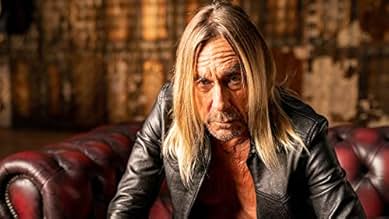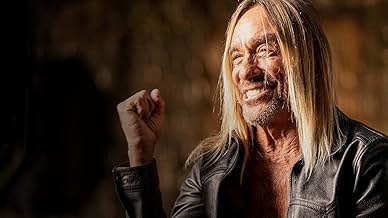Original-Interviews mit Amerikas Punk-Pionieren und den berüchtigtsten Bands Großbritanniens.Original-Interviews mit Amerikas Punk-Pionieren und den berüchtigtsten Bands Großbritanniens.Original-Interviews mit Amerikas Punk-Pionieren und den berüchtigtsten Bands Großbritanniens.
- Auszeichnungen
- 3 Gewinne & 1 Nominierung insgesamt
Folgen durchsuchen
Empfohlene Bewertungen
Have to say that in Australia we're very disappointed in the lack of mention of bands such as The Saints, The Birthday Party and Radio Birdman as key influences in early/mid punk rock in the series. Take a look at NME's review of 'I'm Stranded' 1974...
WHERE ARE THE FOOKIN MISFITS??? And if you talked about SoCal sound, where's the mention of Social Distortion and then a quick mention or recognition of psychobilly as a genre? Otherwise it was an entertaining and good watch.
It was good until episode 4. When you grew up in the 90s in the punk and hardcore scene. People didnt listen to Green Day. They were the band for the kids we always got into fight with because we were punks, the posers who suddenly thought they listen to punk over night because they bought a cd they played on friday when they were partying. thrash metal heads. Hardcore dudes. Not one word of Suicidal Tendencies, MDC, RKL, Misfits, GBH, Discharge. DRI. CRASS, Rudimentary Peni. Nomeansno.The link between Motorhead and punkrock scene. Cro Mags are not mentioned. Just Harley Flanagan as a kid. They jump over so much important bands.. I know you cant get over all bands. but 15 minutes of Bikini Kills when you dont mention the bands above? The history of Bad Brains have been told 15 times the last 20 years in different documentaries. We know how good they were. . Not once have we heard the history of Discharge. How they really got the punk rock scene to blend into hardcore. How Thrash metal and hardcore found a common scene in the early/mid 80s helped many hardcore bands to the next level. Instead you get 30 minutes of green day talking about how many millions records they sold. But still. The first 3 episodes are golden. And the last 10 minutes of episode 4.
What a delightful surprise to find this outstanding series. So many music documentaries are narrated by word salad tossers who talk over the music ~ competing with the artists & their art. The narration in Punk comes from the participants in the punk movement themselves. The artists tell their stories while sitting on some very fascinating couches that became, for me, co-stars in the story.
The documentary traces punk from the late 60's through what's left of punk today. I enjoyed punk in the early days, but drifted on to other music as I aged and as the internet changed the music game. After watching Punk, I'll be exploring old & new bands.
This is a well crafted, perfectly paced film that left me wishing for chapter 5.
The documentary traces punk from the late 60's through what's left of punk today. I enjoyed punk in the early days, but drifted on to other music as I aged and as the internet changed the music game. After watching Punk, I'll be exploring old & new bands.
This is a well crafted, perfectly paced film that left me wishing for chapter 5.
UNK (Epix, 2019) - A four hour Documentary co-Produced by Iggy Pop does an okay job of outlining the history of the music sub-genre from it's earliest roots in the late-60s to the grunge boom in the 90s. Director Jesse James Miller and his writing team break down the Doc into four chapters: 1. 60s and early 70s Proto-Punks like the MC5, New York Dolls and Iggy's The Stooges. 2. Mid-70s NYC's CBGB's with the Ramones and London's scene including the Sex Pistols. 3. 80s California's Hardcore bands like The Circle Jerks and Black Flag. 4. 90s with Nirvana and Green Day. The interviewees range from Marky Ramone to Blondie to Johnny Rotten to Penelope Spheris to Henry Rollins to, of course, the patron saint of Rock Docs, Dave Grohl.
As will all these survey shows, one can always argue about which artist deserved inclusion or not, or which bands got too much or too little attention, but PUNK has a genuinely large chapter missing - the late 70s/early 80s 'Post-Punk' movement which included such major stars as Elvis Costello, The Jam, Sonic Youth and Rotten's own band Public Image Limited. It seems like Miller and the Producers wanted to focus on harder edged bands, which is fair enough. Still, if lighter groups like Blondie, Television and the Talking Heads are covered why not Joy Division, Wire, Devo and The Fall? It's a major missing chapter and feels somewhat arbitrary.
PUNK is an entertaining enough sampler with some obvious gaps. If nothing else, it's kind of interesting to see the interviews and hear disparate voices like Jello Biafra, Bikini Kill's Kathleen Hanna, Legs MacNeil, Flea, Exene Cervenka and Joan Jett look back at that era in music.
Wusstest du schon
- VerbindungenReferenced in Last Stop for Lost Property (2020)
Top-Auswahl
Melde dich zum Bewerten an und greife auf die Watchlist für personalisierte Empfehlungen zu.
- How many seasons does Punk have?Powered by Alexa
Details
- Laufzeit
- 1 Std.(60 min)
- Farbe
Zu dieser Seite beitragen
Bearbeitung vorschlagen oder fehlenden Inhalt hinzufügen



































